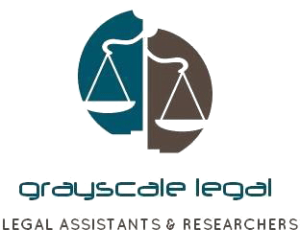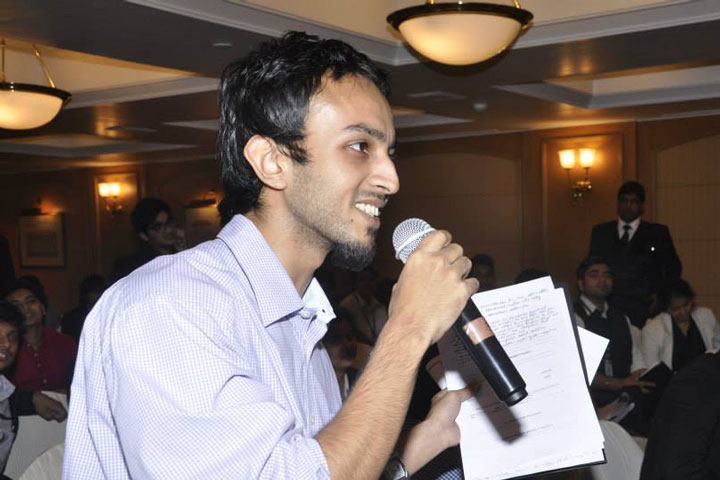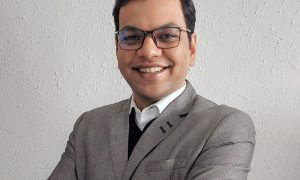 Rohan Mukherjee is a student of NLU Odisha, Cuttack, batch of 2015. In 2013 he started his own entrepreneurial venture, Grayscale Legal, a non-profit company to bridge the gap in demand and supply of good legal research. Grayscale Legal is a Legal Assistance & Research Service Company aimed at getting law students recognized and placed on the basis of their mettle, rather than their grades. Due to Grayscale’s success he was also inducted as a fellow into Kairos Society – a worldwide association for entrepreneurs and innovators. Apart from being an entrepreneur, he has also received a pre-placement offer from India’s first Environment Law firm – Enviro Legal Defence Firm.
Rohan Mukherjee is a student of NLU Odisha, Cuttack, batch of 2015. In 2013 he started his own entrepreneurial venture, Grayscale Legal, a non-profit company to bridge the gap in demand and supply of good legal research. Grayscale Legal is a Legal Assistance & Research Service Company aimed at getting law students recognized and placed on the basis of their mettle, rather than their grades. Due to Grayscale’s success he was also inducted as a fellow into Kairos Society – a worldwide association for entrepreneurs and innovators. Apart from being an entrepreneur, he has also received a pre-placement offer from India’s first Environment Law firm – Enviro Legal Defence Firm.
In this interview he talks to us about:
- Starting up with GrayScale Legal
- Getting inducted into Kairos Society
- His internship experience
How did you gravitate towards law?
Well, that could be a long answer for one question. See, I had given up on my science subjects in school because my interest didn’t lie there, and I saw no sense in pursuing something that I, with all my heart, didn’t see myself in. As a child, when you see your relatives around you who happen to be lawyers, enjoying a great lifestyle, it does create an illusion that life gets to be easy with a robe on. Well, of course, we learn otherwise later on, but the money and influence does play an attractive role to a teenager. Changing the world and fighting for ideals comes later.
What were the different things that you did these five years at NLUO?
Well, I do play drums and percussion, so that kept me engaged in my initial years, although I failed to set up band for the University. I write a lot, sometimes short opinionated satires, or dabble with my own black humor genre of poetry. My apprehension towards public speaking was removed when I was introduced to parliamentary debates, and those seven minutes of speaking time, still makes my adrenaline pumping. Apart from all this, I have been a part of some other ventures and organizations as well in various capacities, like being the Associate Director of Model Governance Foundation at one point. I started Grayscale Legal in my third year, which is a Legal Assistance & Research Service Company aimed at getting law students recognized and placed on the basis of their mettle, rather than their grades. I was recently inducted into the Kairos Society as well.
 Please tell us about your project Grayscale Legal.
Please tell us about your project Grayscale Legal.
We are a Section 25 private limited that provides legal professionals and laymen with Legal Research and Assistance. Our basic aim is to assign students to professionals on various assignments on a monthly basis or a task wise basis in order to get their work recognized by the concerned client which in turn materializes into further opportunities and job offers.
Where did you get the inspiration for this venture?
It started as a survival instinct for myself. I knew that just my grades won’t get me ‘placed’ anywhere, but at the same time I also knew that I wasn’t a complete idiot. The only way to make a potential employer know you for your work, for the sheer ability to perform and deliver and to an extent ignore the fact that exams are not your best friend, was to take up assignments from them directly and work in exchange for recognition. Also, law offices do not have legal interns in their office all the time, and being a cloud based company, we get to fill in that gap virtually. Also, with students’ access to campus libraries, online legal databases etc., the research material is vicariously accessible to the clients as well.
What factors do you think makes your project innovative and successful?
We are far from successful at this juncture. But I would like to think of Grayscale Legal as a way to bridge the gap between campus and offices. Sure, there is nothing innovative about that, but our aim is not to simply dole out research assignments, our aim is to enable law students to generate their own pool of contacts – established professionals who recognize and recommend them for their professionalism. I should also vouch for the selfish interest factor, where a student is assigned to a client, it is up to him/her to undertake full responsibility for these projects and apart from the commission, the prospect of a job offer, that you have managed to earn yourself is a kick in itself.
Initial investment is a big issue for any start- up, how did you manage that?
Being a cloud based company, and a non-profit one, I was able to bootstrap the initial expenditure from my father and uncle. I am fortunate that they saw some merit in this idea and were on board. Of course, our expenditure is limited to the website maintenance and incorporation costs.
What challenges arise when you handle law school and entrepreneurship at the same time?
I don’t really get worked up about on-campus matters, apart from the gnawing fact that I need to graduate next year at all cost. But for me, Grayscale Legal takes complete precedence over everything else. I mean, to be honest, I wouldn’t be where ever I am, giving this interview, I wouldn’t be attending client meetings and speaking to them on a level basis if not for this company. Every week starts off with a full blast of insecurity and every day is a pounding of anxieties when it comes to the future of the company, or daily assignments for that matter. I do tend to micromanage a lot, which was my strategy to prevent anything from getting messed up, but I am gradually training myself to let things go – or to delegate them to other people.
Tell us a bit about Kairos society. What do you have to do being a part of it? How did you become a member?
The Kairos Fellowship is designed to support individuals working on high-impact ventures. The newly inducted members are immediately entered into a community of likeminded changemakers, and they’re presented with opportunities to connect with industry leaders and influencers through Kairos events and Kairos partners. When their venture is ready for distribution, they’re encouraged to apply for this Kairos 50 venture program. You can also read a bit about it on Kairos Society
The Kairos Society started with a vision: What if the leaders of today were friends 30 years ago, working together to solve our world’s grandest challenges? Becoming a Kairos fellow is a commitment to impact, and we hope to take full advantage of the opportunities presented to us throughout the year. More importantly, we hope to continue to support each other on the path to creating meaningful ventures, and build relationships that will last a lifetime.
To become a member you have to be recommended by an existing fellow or apply on your own. The modalities are on their website. This is open for students working on their ventures that might have a global impact.
How supportive are your parents and peers towards this project?
Well, there is plenty of support from my parents. Rest, I haven’t really thought about. Doesn’t matter anyway. As long as you know what you’re doing, and doing it well and with complete dedication, charging after it like a rhino – Support and good wishes from third parties are just a bonus.
Why are so many aspiring lawyers taking the entrepreneurial plunge?
No campus placements? Kidding. In my view entrepreneurship and litigation walk hand in hand – the thrill and risk of starting your practice from scratch, making your services worth the client’s money, client retention, growth and expansion of business are all common areas. Of course, we are lucky to be living in this era where the internet apart from making us aware various prospects, has given birth to many ventures as well. Also people have starting to realize that a law degree is a like a passport to a multitude of fields, and is never necessarily bound in a chain. It is brilliant that many are turning to set up their own ventures that have changed the way the legal fraternity interacts with the legal ecosystem. There still has to be a burst in technological innovation in this field – we are still satisfied with an Android app of the Supreme Court listing, where as there are software programs used in other countries, by lawyers, which reduce the time taken for legal research by leaps and bounds. That level of tech-savviness still needs to come in India. Hopefully, our generation will take care of that.
What specific areas of law education helped you in your venture?
I would have to say Company Law since it is after all an incorporated entity. But frankly, no legal education really prepares you for this. Today I can rattle out the importance and use of DIN (Director Identification Number), the process of preparing and filing the MoA and AoA, the documents used, the property documents to be produced as proof for office space – and no paper prepared me for this, or it could have, but I didn’t pay attention. I mean, the idea that we could possibly register ourselves as a Section 25 company came to me after going through online articles, and then perusing through Section 25 of the Companies Act itself. Which is also interesting because strictly speaking, the provision chalks out organizations whose purposes are ‘educational’, ‘charitable’ or ‘religious’ – but it is followed by ‘or any other useful purpose’. I reckoned that our work is definitely ‘useful’ so I cast my line based purely on calculated guts.
Do you intend to work for this project primarily after your graduation?
After graduation my priorities will naturally change. I need to build myself as a legal professional first and foremost, and I realize that I will not be able to juggle both with equal dedication and in essence, fail to do justice to both of these arenas. I do intend to shift the management of the Company to another student, and of course, in our line of work it makes perfect sense for the person to be personally motivated to see the company grow and evolve and use it as means to your professional life, and that can only appeal to a student, someone who generally will possess that sense of urgency and insecurity. I will still remain a Director, but will restrict my involvement to the bare minimum.
Did you get any institutional support for internships from your college?
In my course of four years, I have interned with Sr. Adv. Uday U. Lalit, West Bengal Human Rights Commission, Enviro Legal Defence Firm (ELDF), Sinha & Co., AZB Delhi, AZB Mumbai and followed by a string of ELDF internships.
I would say all of them helped shape up my career choice in a great way. Sometimes, only after gaining some experience in a particular office can you be completely assured of your distaste for that work culture or professional life. I remember during my second year, when was interning with ELDF for the first time, there was a day when the office was almost empty and our Managing Partner, Sanjay Upadhyay simply asked me to speak to a client who would be coming in a while since he had to leave as well. I mean, it might not seem a big deal, but as a second year student, to be able to interact with a client with no one overseeing your interaction at that point was itself a kick. My subsequent internships with ELDF have been amazing as well – I have also been to our North Eastern office in Guwahati a few months back, and to be involved to this extent at this level, is something very few mentors can successfully do. Of course, you are constantly humbled by the fact when it comes to any field of law, let’s say laws concerning the environment in this case, there is so much to know – and the in-depth knowledge that is required for a person to confidently say, that yeah, I know this subject, takes a lifetime. Or perhaps, more!
How did you apply to Enviro Legal Defence Firm?
For an internship, you are required to mail the Internship In-Charge Ms. Suparna Jain at [email protected] and that is usually followed by a submission of your CV and a short essay encircling your statement of purpose etc. A student can intern for four weeks or more and if I remember correctly, during my second year, they did say that they take in students from their third year onwards, but I managed to get an exception since we had covered, on paper, Environmental Law as a subject in our second year.
Tell us a bit about the firm, your typical workday and the overall work/life balance.
ELDF is an independent team of erudite legal professionals, which provides services to anyone who approaches us, including Governments, Non-Government Organizations, Educational Institutions, Individuals, Private and External Agencies engaged in areas of environment and development law. We have been a part of numerous international forums and have helped in policy building in many nations. Our firm is divided into two teams – Consultancy and Litigation. There are various regional offices present in cities like Pune, Guwahati, Ernakulam and Ranchi.
My typical work day is like any other associate at the firm. Since, I work with the litigation team, if a matter I am involved in is listed in the NGT or Supreme Court, I have to be there for the hearing. If not, the work on the cases/projects assigned which ranges from research, drafting, client meetings, further information gathering and strategy building takes up time. The question of work/life balance is a difficult one, of course.
I am one of those who believe that if you are passionate about your work, it is difficult to switch your ‘professional life’ off after 9 PM or maintain some form of clock for the same. I won’t say that there is an extreme pressure, but it certainly depends on an individual’s priorities. Even as an intern you are credited at par with associates, and made answerable for any screw-ups as well. Office hours would be from 10 AM to 6 PM, but as in any law office, you are expected to put in extra hours if the work demands so.
What do you think interns should accomplish in the course of their internship to get a callback?
(Rohan has secured a PPO with ELDF.)
You have to market your strengths in any work environment. And it’s not like you have to prowl around for any work offer that may come your way, if you are genuinely interested in a particular field and feel that a particular law office shall provide you with the perfect exposure in the same, go for it.
After a few conversations with Sanjay Sir, I had made some form of positive impression on him. Hes has also been a guide when I was setting up Grayscale Legal and was instrumental in providing his feedback on the same. It is very difficult to pin-point exactly ‘how it happened’ because it happened very naturally which is how it should be. And naturally, my work with Grayscale Legal certainly played a role in backing this up as well.
Was there any interview process?
There wasn’t any formal interview as such for this. There might be one after graduation though.
Where do you see yourself five years from now?
The initial 5 years will be difficult, and frankly, I look forward to the nudging and pushing required now. Five years is also a make-it-or-break-it period for myself; the time required to be well versed with the laws and procedures; to have substantial visibility in courts and do my work well. For me, nothing takes priority over a client’s interest – one might get into long ethical debates on the same, but let’s save that for later. For a start, apart from my legal career, I’d love to open up a quaint, warm pub, I’d like to pursue my music as well – so five years down the line, I hope I am happy with where ever I am. Or perhaps not. Being dissatisfied has worked out well for me so far.
What would be your message to law students who want to start-up?
Go for it. Trust me, you will not get a better time to fall, fail and learn again.


























